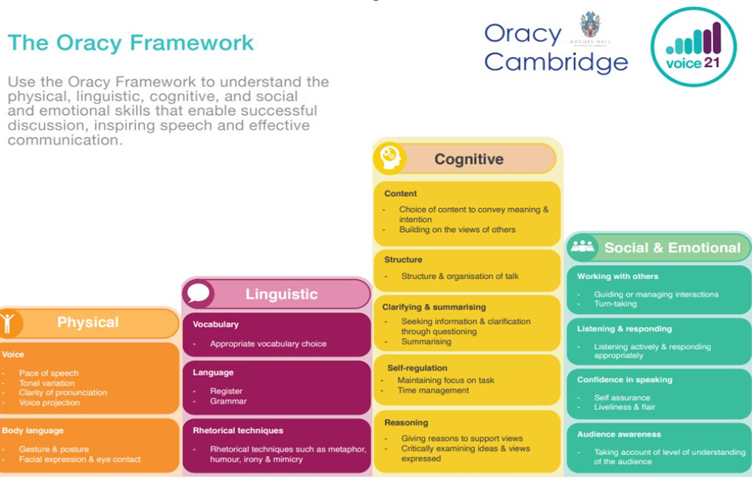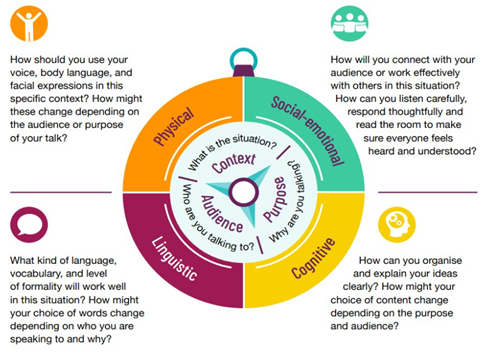Oracy at The Polygon
We want all students to have a voice and to have the speaking and listening skills to equip them for life.
Intent
We believe spoken language to be fundamental to the achievement of our students and to them as life-long learners. To ensure that we are teaching oracy skills across the curriculum and providing our children with a range of oracy opportunities, we have joined the Voice 21 project (a charity which aims to improve the teaching of oracy in schools).
The project will ensure that teachers and leaders are equipped with the skills to develop oracy for teaching and learning, to plan for talk across the curriculum and to elevate speaking beyond the classroom. The project will build a culture of oracy within our school to support and develop our students’ confidence, spoken language and written outcomes across and beyond the curriculum.
Our aim is to enable our students to improve their levels of oracy so that all students are able to communicate effectively and confidently in front of any type of audience. These skills are being encouraged in every area of our curriculum as good communication skills can enhance every type of learning.
The Polygon students are encouraged to explore ideas through talk; challenge each other’s opinions and develop their own reasoned arguments, as well as talking in full sentences with a clear and confident voice. Many of our students start The Polygon without the oracy skills relevant for their age or the confidence and self-esteem to try. We strive to develop spoken language skills through the taught curriculum, the hidden curriculum, break and lunchtimes, personal development activities and the whole ethos of the school.
Respectful and productive relationships between all who form part of the school community are crucial aspects of this ethos. As a staff, we foster good communication amongst ourselves and with our students, their parents and carers, and with the wider community. We place a high priority on supporting the development of good speaking and listening skills amongst our students.
Our oracy provision will enable our students to:
- speak with confidence, clarity and fluency;
- recognise the value of listening;
- be confident in their own opinions and to be able to express them to others respectfully;
- adapt their use of language for a range of different purposes and audiences;
- sustain a logical argument and respond to others appropriately;
- interpret and respond appropriately to a wide range of listening experiences;
- be open-minded, to value the contribution of others and their views;
- appreciate the diversity of languages, dialects and accents in the school and value the experience and contributions of children with a wide variety of linguistic backgrounds;
- share their learning in an engaging and informative ways.
Implementation
Correct spoken language is fundamental to learning. Speaking and listening play a large part in a student’s progress in all curriculum areas and teachers plan to develop these skills in a wide variety of ways. Reading lessons are structured around a 20min Oracy activity linked to the Oracy Framework (During October 2025 Voice 21's October Challenge) and 20mins Reading for enjoyment. Subject leaders prioritise the development of oracy within their teaching practice highlighting and praising good examples to students when they are using these skills. Subject leaders promote oracy by adding photos of oracy in action to the working wall in room 4 showcasing oracy across the school. The Polygon School will continue to listen to student voice be led by student’s interests regarding oracy i.e. singing club, 3JG's production of Beowulf.
We aim to develop and encourage fluent speakers, who can confidently articulate their ideas in a wide range of situations. Pupils should have a range of planned oracy experiences, which include:
- drama, singing, poetry, performing comedy, theatre trips;
- talking partners, paired and teamwork exercises within lessons;
- listening to stories in reading lessons and with tutor;
- reading interventions, oracy lessons;
- preparation for writing;
- visiting speakers, personal development opportunities;
- giving and receiving instructions;
- Role modelling and coaching opportunities
- Lunchtime discussions with staff around the table
- presentations of learning within and outside school;
- Friday assemblies;
- School council and Eco Council meetings and other pupil voice activities;
- After school clubs
Impact
The impact of this area of the curriculum will be evidenced through the monitoring of attainment and progress of all students by teachers. Oracy skills will be assessed using the oracy framework. The English and Reading Leads, Teaching and Learning Lead, SLT, Head teacher and link Governor will be responsible for monitoring the impact of Oracy and standards of spoken language across the school, through work scrutiny, planning scrutiny, learning walks and lesson observations and any other relevant monitoring activities. It is every teacher’s responsibility to ensure that Oracy is promoted within their subject and the schools Oracy statement is adhered to.


